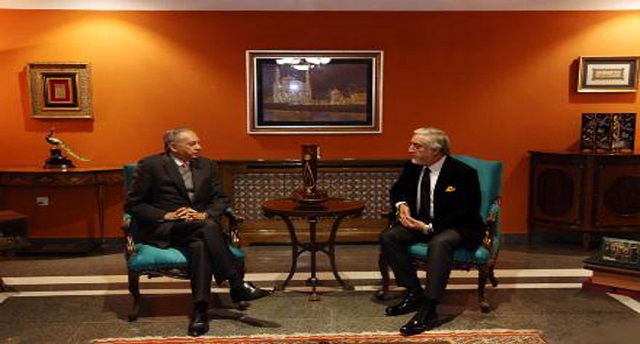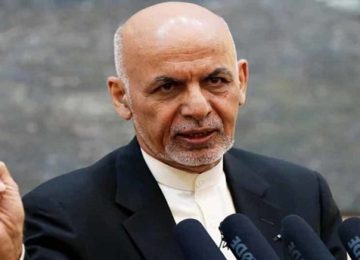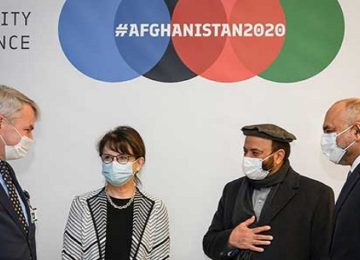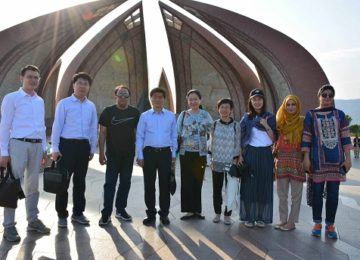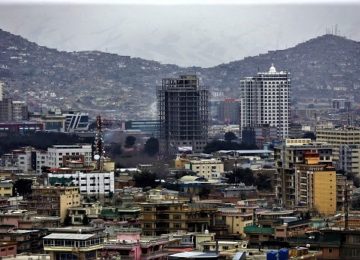November 18, 2020
Pakistani and Afghan customs on Tuesday signed a Memorandum of Understanding to exchange electronic data interchange for rapid and hassle-free movement of the transit goods to save the time and money, officials said.
The MoU was inked after Advisor to the Prime Minister on Commerce and Investment Razak Dawood and Afghan Minister of Industry & Commerce Nisar Ahmed Ghoryani held talks in Afghan capital Kabul on ways to boost bilateral trade and remove hurdles in transit trade, the Pakistani embassy in Kabul said.
Both sides also discussed opening of new corridors and ports of entry/Exit for Afghan Transit Trade to provide the maximum relief to the Afghan traders, according to a Pakistani embassy statement.
“Both sides agreed to take further steps for enhancement of effective connectivity which is essential in today’s era for smooth transportation of transit goods,” the statement said.
It was also decided in the meeting that further deliberations would be made in the next meeting to be held in Islamabad in December, 2020.
Both countries also held the 7th meeting of Afghanistan Pakistan Transit Trade Coordination Authority (APTTCA) after years of break. The last meeting of APTTCA was held in Islamabad in 2016, which review implementation of the Afghanistan Pakistan Transit Trade Agreement (APTTA).
Dawood remarked that new era between both the countries has begun and assured his full support to the people of Afghanistan to develop better future for the next generation.
“We are committed for greater integration and ready to work together for the prosperity of the region,” the statement quoted the adviser as saying.
The meeting was held to review and renegotiate The Afghanistan Pakistan Transit Trade Agreement which is going to expire in February 2021.
Pakistan and landlocked Afghanistan had signed a transit trade agreement in 1965 that was revised in 2010. Pakistan had been providing transit facility to Afghanistan since then and both sides have now suggested amendments in the APTTA.
Muhammad Sualeh Ahmad Faruqui, Federal Secretary of Commerce & Investment and Mr. Abdul Karim Malik Yar, Afghan Deputy Minister for Investment and Trade along with their respective teams deliberated upon in detail all aspects of the Transit Trade Agreement between both the countries.
They showed their full commitment to streamline existing procedures to boost bilateral trade, transit facilities and investment which is essential for the prosperity of the people living both sides of the borders.
Mr. Mansoor Ahmad Khan, Ambassador of Pakistan to Afghanistan, and Muhammad Sulaeh Ahmad Faruqui, Secretary, Ministry of Commerce, Mr. Rizwan Ahmed Shaikh, Secretary Ministry of Maritime Affairs, Syed Muhammad Tariq Huda, Member Customs, Federal Board of Revenue, Mrs. Maria Kazi, Joint Secretary, Ministry of Commerce, Mr. Saeed Khan Jadoon, Chief (F&C), federal Board of Revenue, Mr. Noorullah, Senior Joint Director, (Exchange Policy Department), State Bank of Pakistan, Syed Muhammad Baqir Jahanzeb, Deputy Director to Advisor on commerce and Investment, Mr. Umar Minhas, Section Officer, Ministry of Commerce were also present on the occasion.
Last month business leaders, members of chambers of commerce and lawmakers from both countries attended a two-day seminar on Pakistan-Afghanistan Trade and Investment Forum 2020 in Islamabad and deliberated on ways to open up new vistas of cooperation and boost bilateral trade between Pakistan and Afghanistan.
Commerce Minister of Afghanistan Nisar Ghoriyani, who also visited Pakistan last month held talks with Pakistani officials to boost bilateral trade and to address each other’s concerns regarding problems in bilateral and transit trade. Pakistan Customs and Afghanistan Customs sign MoU for exchange of Electronic Data Interchange of Transit trade to streamline bilateral trade in Kabul on Tuesday.
The author Tahir Khan is a distinguished member of CRSS’ Pakistan Afghanistan Track 1.5/II initiative Beyond Boundaries.
Source: Daily Times
Disclaimer: Views expressed on this blog are not necessarily endorsed or supported by the Afghan Studies Center and Center for Research and Security Studies, Islamabad.



